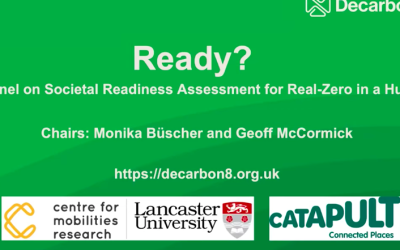Monika Buscher and Lixiong Chen are attending the 16th International Conference on Intelligent Systems for Crisis Response and Management 19-22 May 2019.
Monika will present the keynote on the final day:
Making IT Personal: Radically Reflexive Resilience
The 21st Century has been labelled the century of disasters. Yet individuals and societies are doing too little, too late to prepare for or prevent disasters. One reason is a lack of personalisation. People do not feel that disasters will affect them. This is particularly true with regard to slow-motion disasters such as climate change, biodiversity loss, soil erosion, or antimicrobial resistance, but acute emergency warnings and evacuation orders can also be met by optimistic bias (‘It won’t happen to me/here’). Personalisation and intelligent context-driven computing can triangulate personal risk factors (such as location and vulnerability) with predictive disaster risk data to dynamically issue personalised warnings and guidance. It can save lives. However, a ‘solutionist’ turn to computational personalisation could further entrench problematic patterns of disaster risk governance and a false sense of security.
As the Anthropocene unfolds, many slow-motion disasters are producing more, and more intense, acute disasters, from extreme weather to epidemics. These arise from the cumulative personal lives of 7.7 billion humans, with risks highly unequally distributed. In this talk, I show that attention to grassroots creativity that makes responsibility for risk and risk governance personal can enhance communities’ capacity to live well with risk. Technologies of participation that support crisis informatics, citizen science, and collective intelligence, for example around environmental monitoring, can join with efforts of personalisation. By delineating hopeful projects that develop technologies of humility, we can widen the scope for innovation and raise the bar of ambition for personalised and context-driven computing to support radically reflexive resilience.
Lixiong will present a paper jointly authored with Monika Buscher and Yang Hu:
On Liquid Ground: Contesting facts and responsibilities on Weibo during the Shouguang Flood
As one of the most well-known social media platforms in China, Weibo provides an online public sphere. During the 2018 Shouguang flood, many people who were affected converged on the platformto discuss thedisaster. The government – the highest emergency management authority – was accused of using censorship and other measures to suppress the coverage of the disaster. Based on an analysis of 34 qualitative interviews with Weibo users, of which nine directly address the Shouguang floods, this paper examines how three major actors contested facts and responsibilities during the disaster. Focusing on the state-censored, market-moderated social media context in China, our ongoing study provides new insights into a universal challenge of managing diverging interpretations and expectations in risk communication. We show that the establishing and framing of facts is inherently ethical and political. Time, time-space compression, liability and scales of risk responsibility emerge as critical points of friction. We draw on theories of risk governance, public discourse, computer supported collaborative work, and media studies for analysis and to articulate avenues for design.




